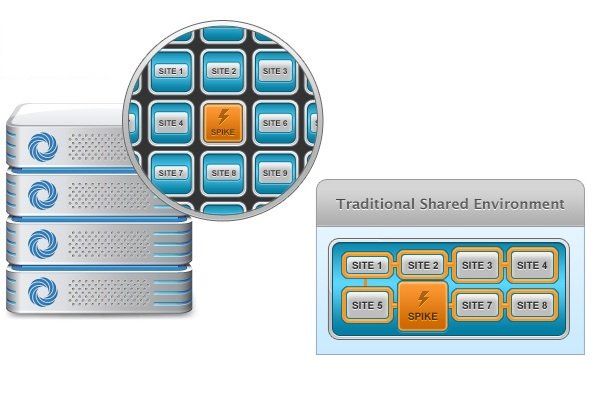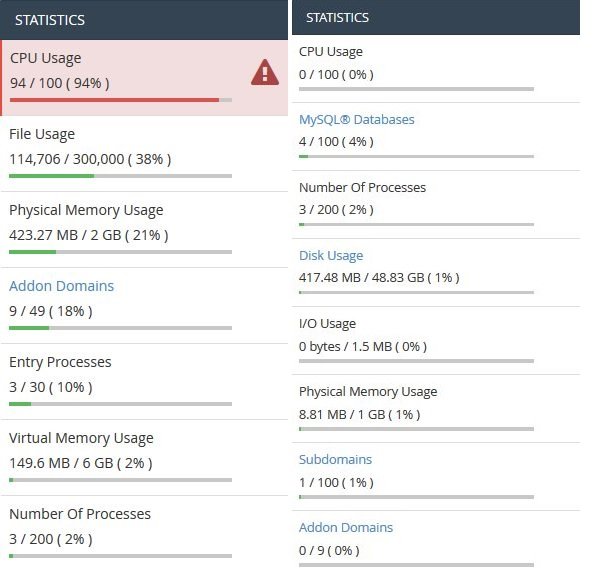What Is A Linux CloudAnd Why Is It A Good Choice For Shared Hosting?
One Of The Most Important Topics In Cloud Computing, which is less discussed by websites and network experts, is the importance of the Linux Cloud In Shared Web Hosting.
Another essential point to consider regarding cloud computing is the differences between a Linux cloud and a Windows cloud.
Companies that decide to enter the world of cloud service providers and hosting space are looking for a solution that ensures access to a high level of sustainability so that they can use their services confidently and achieve significant profitability.
However, companies face various challenges that make achieving the highest level of sustainability challenging. These problems include the sudden increase in traffic, system resources, cyberattacks, and hardware failures that network administrators face daily.
Based on the importance of Linux in the cloud world, this article will take a closer look at this concept. However, to provide excellent, rich content, we will also examine the Windows cloud and compare these two operating systems in terms of cloud performance.
Typically, it would help if you had a server hosted on a data center to host your website.
This server can be a shared server that hosts other websites or a dedicated server that provides you with a significant amount of space to host the website. With cloud hosting, you are not limited to one server. Your website is connected to a network of servers, each in a specific geographical location and connected via the Internet.
To be more precise, the resources that your website needs to function well are distributed across multiple servers. This super-centric hosting architecture has many advantages. For example, instead of relying solely on the capabilities provided by one server, your website’s workload is divided between several different servers that provide shared resources.
This approach will significantly improve your website’s performance. In this scenario, if one of the servers crashes or malfunctions, your website will perform normally, as other servers can easily accept and service the broken server.
Based on this definition, we find that cloud hosting is secure, reliable, flexible, and cost-effective. It allows you to expand the resources required by the website if users well receive your website. However, choosing the right cloud host is a complex process.
In addition to the various capabilities and resources you must consider carefully, the operating systems they serve are critical. Cloud hosting can be based on Windows or Linux operating systems, so consumers are not restricted when choosing the option.
Choosing an excellent operating system with the proper infrastructure is very important to minimize problems and costs, and that is why some companies are moving to the Linux cloud.
What is a Linux Cloud?
Linux was first introduced to the world of information technology in 2010. Today, it has become one of the top choices in web hosting and has answered all the concerns about sustainability, bandwidth, and security.
A Linux cloud is an infrastructure based on a Linux distribution implemented to implement shared hosting space for better security and stability.
The website is hosted on a cloud platform that uses the Linux operating system as the infrastructure in the Linux cloud. Based on this definition, a good Linux distribution is the key to achieving shared hosting space.
In this case, it does not matter what operating system your PC uses because any website hosted by a Linux or Windows cloud can easily communicate with the operating systems on your PC.
What matters is the programming language you use to build the site, and the web hosting platform must support it. Modifications to the Linux kernel have added efficient features to Linux server distributions that better monitor and control server resource usage.
The Linux cloud uses an isolated approach to dealing with everyday problems, crashes, and cyber threats. Issues that arise in user accounts do not affect other charges, and user accounts can provide services with greater reliability.
In this regard, the Windows operating system, or, more precisely, Microsoft Azure, offers a similar capability.
One of the essential features of the Linux cloud is the Lightweight Virtual Environment (LVE). With this feature, the Linux cloud uses virtualization for user accounts and assigns a certain amount of resources to each LVE.
Virtualization of users through LVE technology allows for the limitation of allocated resources such as main memory, CPU, and storage space for each user so that excessive resource consumption does not affect server performance.
However, suppose one of the websites hosted on the server encounters a sharp increase in traffic or consumes a large amount of main memory and CPU due to coding problems or malware attacks at once.
Instead of the server being slow and disrupted in providing services Again, only the LVE is specified, and the sites on the server will continue to work without any problems.
This architecture is significant for companies in online commerce that need continuous services because it ensures optimal performance concerning a wide range of services. As cloud servers use different systems simultaneously, performance increases significantly.
How to improve shared hosting with Linux cloud
As mentioned, a shared web hosting space is where hundreds of sites are hosted side by side and share a single server resource. Typically, server administrators have limited access and control over how much websites use server resources.
In this case, if one of the websites hosted on the server consumes resources simultaneously (such as DDoS attacks, poorly coded JavaScript scripts, a sudden increase in traffic, and the like), the server will slow down, and all the hosted websites will be down. It slows down the server, which ultimately leads to consumer dissatisfaction.
Under normal circumstances, exercising much control over each user’s main memory and CPU consumption is impossible. In addition, identifying sites with overused resources is a complicated process.
What companies are suitable for Linux cloud servers?
Typically, companies that constantly deal with a large amount of data and have to process a lot of data in the shortest possible time should use Linux cloud servers. In this case, users can easily access these servers from anywhere using PCs, as long as they have a stable internet connection.
The Linux cloud server is cost-effective because you only pay for what you use. You can make changes to the system and manage security according to your policies. Based on this definition, Linux cloud hosting is fast, reliable, cost-effective, and scalable.
What is Windows Cloud Hosting?
Windows cloud hosting is when the Windows operating system hosts a website in a cloud computing platform. The main advantage of hosting Windows Cloud is its high mobility and easier interaction with Microsoft products.
So that consumers can use the latest version of Windows Server, which provides access to a wide range of specific programs; these programs include the following:
.Net Framework
It would help if you had a Windows server for any services you offer that specifically require a .NET framework. More precisely, if the website’s coding is based on Windows Active Server (ASP.Net) pages, you need a Windows server.
Visual Basic
If you work with Visual Basic, you need a Windows server. You also need Windows to access any product in the Microsoft stack, such as Exchange, an enterprise email server. Even when using SharePoint and the SharePoint Designer tool, a Windows server is still required.
MS Access and MS SQL
If you use MS Access Database or MS SQL Server, Windows Hosting provides access to convenient application services.
Linux cloud hosting vs. Windows cloud hosting
- Linux cloud hosting is cheaper than Windows cloud hosting. Because Linux is an open-source platform and is free for everyone, it costs users less to set it up. Before you can use the Microsoft Windows Server operating system, you must obtain a license to use that operating system. Of course, in this regard, the rule of the Iranian technology market is different from other countries, and you have to spend in both cases, so there is not much difference, especially since there are very few companies in Iran that bought Microsoft Windows with a valid license. They do. Individuals or companies that have previously invested in Microsoft products should use the same Windows cloud host to avoid significant changes in their business model.
- Linux cloud hosting works well with frameworks, programming languages, Dreamweaver, MySQL, and CGI databases. Linux clouds, which have a significant advantage over Windows clouds, best support Python and Patch Up. Of course, Windows Cloud Hosting works well with the PHP language, but it does not work as smoothly and flexibly as ASP, MS SQL, and ASP.NET.
- The big challenge for Linux-based systems is not accurate and efficient .NET hosting because the framework is Windows and works best with Windows Server. Of course, .Net Core is somewhat effective in this regard.
- Both models use the same approach to data management. Both support FTP servers and are compatible with JavaScript and HTML. However, the Linux cloud computing infrastructure offers better performance and interaction with JavaScript and HTML. Linux cloud computing is more popular with large organizations than Windows because, with open-source distributions, it is easy to reprogram everything to meet the needs of the business in specific areas.
- Linux cloud hosting is more secure than Windows cloud hosting. Because Linux is an open-source distribution, security experts can observe how Linux works and modify it as needed without complex code reproduction processes. This feature will enable people to change the operating system and fix any problems themselves. On the other hand, Windows is proprietary, and Microsoft does not allow users to make changes to the code; only Microsoft is allowed to make changes.
Why is Linux cloud a good choice?
One of the most important benefits of a Linux cloud for managing shared hosting space is limiting the resources allocated to websites. When there is a problem with the number of resources used by a website, instead of all the sites hosted on the server having trouble, the disruption remains only within the scope of that website, and other areas continue to operate normally. Once site conditions return to stable, resource allocation returns to normal.
The essential features that make Linux Cloud a better choice for hosting shared webspace are:
- Improving sustainability by limiting the resources that each user can use: In shared web hosting space, one of the main factors that cause server instability is a technical problem encountered by the service recipient (website). Under such conditions, Linux clouds can maintain environmental stability using LVE technology.
- Improve server security: The Linux cloud uses CageFS technology to isolate any client so that users can not access each other’s information. CageFS is a virtual file system and a set of tools that keep each user in the isolated environment assigned to them. In addition, the technique prevents the implementation of attacks such as escalating scores and disclosing information.
- Improve server performance: The Linux cloud does not allow server resources to be wasted in vain by controlling consumption and monitoring the increasing use of resources.
- Support for different print versions: The Linux cloud allows you to allow customers to use different print versions and access a wide range of print extensions.
- Hardened kernel: The shared hosting environment is unlike any other everyday environment, and this is the design of the Linux cloud kernel. The Linux cloud protects the server from simulation and tracking attacks, allowing ProcFS to be viewed only in critical situations to improve server security. A hardened Linux kernel can prevent hackers from attacking other sites hosted on the server.
How to create a Linux cloud?
The points you are familiar with in this article describe the powerful Linux distribution capabilities called CloudLinux, which sites use to describe the Linux cloud. The cloud is a CentOS-based distribution that, as noted, forms the basis of Lightweight Virtual Environment (LVE) technology.
In shared hosting, the most common reason for server downtime and downtime is a single account. Whenever the server feels a site needs more resources, it provides shared resources with other sites to the heavy spot. Thus, performance problems. What CloudLinux distributions do is maintain server stability. In this case, each server user uses only the amount of resources the operating system provides.
Figure 1 shows the difference between the performance of a traditional server environment and a Linux cloud. Another essential feature the Linux cloud provides consumers is accurate resource monitoring.
You can check the usage of available resources on the left side of the Sipanel home screen. For example, in Figure 2, you can see that the service consumer has reached its limitations about the CPU, while the consumer on the right has no specific use of resources (Figure 2).

figure 1

figure 2
last word
The Linux cloud can improve website stability and security and prevent common site performance problems. In addition, we should not overlook the fact that the main focus of services offered on Amazon Web Services is Apache CloudStack, Rackspace, Google Cloud Infrastructure, and OpenStack Linux.

